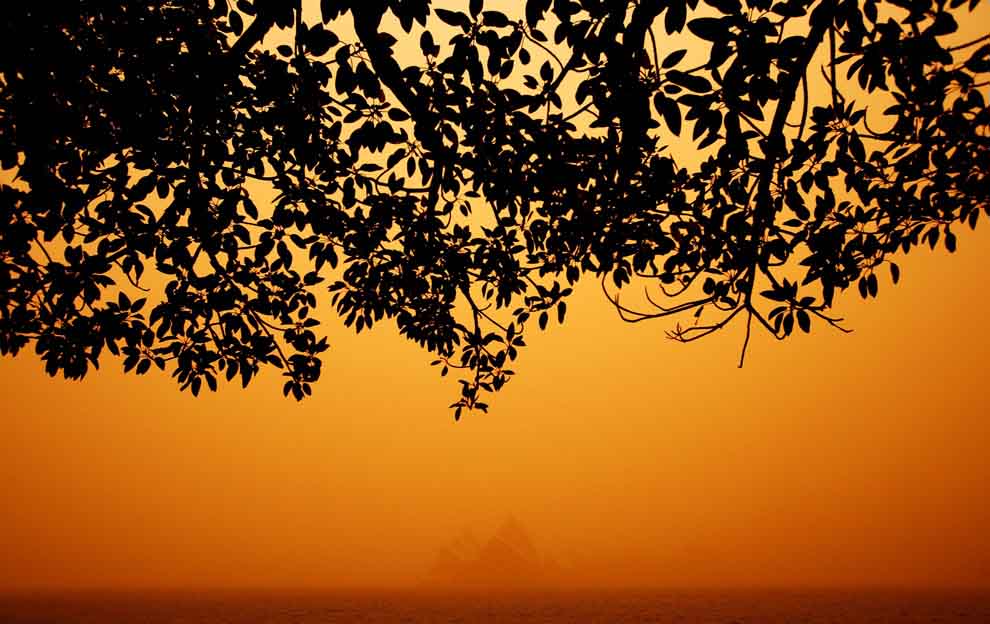Does it seem to you that the days are shorter
And does it seem to you that the nights seem so much longer
Well it does to me, and in time you will see
That the fate of the world is burning in fire– Deströyer 666, Genesis to Genocide
In my visions of another age, Australia is a domain of rogues and devils, swept by sands and heat, a colony of fear. Aboriginals fight, mutated animals leap and grappling hooks are thrown from jeeps that speed with metallic roar across the wasteland. Humanity decays, but Australia preserves the instinct for survival, man against desert, taking pleasure in the primitive actions of hunting, fighting, lovemaking and getting drunk on bourbon. Nocturnal winds howl through the chasms, kangaroos leap over graves and tribal chants are raised amidst campfires as skull goblets are raised.
While I have never been to the country, the impressions of Australian black and death metal do nothing but strengthen the images of brutal frontier life. The sense of the wild is different, more internalized, almost Jack London -like, compared to the European romanticized walks in civilized Teutorburger woods or pure, silent Scandinavian nature. Australians are rebels who have tasted the whip of slavery and still remember it – with hate in their blood.
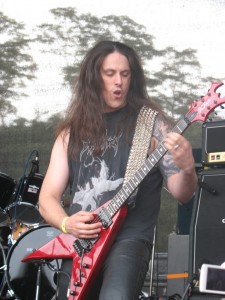 Every rock fan knows AC/DC and Nick Cave, the astonishing twin pillars that represent total opposites of image and style roleplay in hard rock. Both of them influenced heavy metal around the world, but a mainstream fan would be hard pressed to name any other Australian bands of note. I’m not going to dwell on the early 80s, but mention some events that were triggered by the resurgent death and black metal ideas of Europe and the USA.
Every rock fan knows AC/DC and Nick Cave, the astonishing twin pillars that represent total opposites of image and style roleplay in hard rock. Both of them influenced heavy metal around the world, but a mainstream fan would be hard pressed to name any other Australian bands of note. I’m not going to dwell on the early 80s, but mention some events that were triggered by the resurgent death and black metal ideas of Europe and the USA.
Australia is characterized by geographical distance from the Western pop culture trends and so, death metal didn’t happen early but it was marked by a serious intensity from the beginning. As a perfect example, we can take Armoured Angel, who with their late 80s series of demos gradually developed from a heavy and grinding version of speed metal into a technical artillery of militantly precise death metal akin to Polish innovators Vader. Hobbs’ Angel of Death, due both to their cult reputation and connections to later more visceral bands, proved definitive with their self titled album in establishing the early death metal attitude and sound of bands like Destruction and Slayer in Down Under. Hobbs’ raw, molten hot solo bends and breaks were like burning gasoline leaking from a bullet torn hole in a fighter plane. Meanwhile, Sadistik Exekution initiated their campaign of abuse against every known musical principle, which continues up to this day.
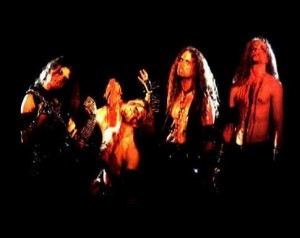 Influenced by hardcore and speed metal, these madmen from Sydney proceeded to destroy the reputability of Australian metal with their on-stage and off-stage antics, almost becoming performance art with their macabre, sarcastic terror campaign of pure noise. Already “The Magus”, recorded in 1986, suggested that this band would dare to go where others would not, the subconscious realm of damnations and mutations, yet containing the elements within an underground death metal rhythm and riff based format. Their second and best album, “We Are Death… Fukk You!” was already something else – a noisy freakshow of an album, with the catatonic, desperate screams of Rok and nearly fusion jazz-y random blasts of violence from the strings of Rev Kriss Hades and Dave Slave. Sadly, their later albums mostly devolved into using the madness as a gimmick instead of a mode to express actual items of perception.
Influenced by hardcore and speed metal, these madmen from Sydney proceeded to destroy the reputability of Australian metal with their on-stage and off-stage antics, almost becoming performance art with their macabre, sarcastic terror campaign of pure noise. Already “The Magus”, recorded in 1986, suggested that this band would dare to go where others would not, the subconscious realm of damnations and mutations, yet containing the elements within an underground death metal rhythm and riff based format. Their second and best album, “We Are Death… Fukk You!” was already something else – a noisy freakshow of an album, with the catatonic, desperate screams of Rok and nearly fusion jazz-y random blasts of violence from the strings of Rev Kriss Hades and Dave Slave. Sadly, their later albums mostly devolved into using the madness as a gimmick instead of a mode to express actual items of perception.
The next generation produced more self-contained music but it also showed the blooming of the world wide death metal presence, as we are talking about the days when death metal was at its commercial heights, ’91-’93. Many bands wanted to be like their big brethren in Florida, as a shameful but popular example let’s mention Mortification, who aped the thrashy sound of early Death with some of the complex rhythms of Obituary or Suffocation, yet infiltrating the standard gore text with reborn Christian propaganda, which had a widespread presence in Australian metal at large. Meanwhile, a band like Anatomy, whose elegant use of melody as texture, akin to Swedish bands like Grave or maybe even At the Gates, remained unknown to most death metal fans. Anatomy’s constructions weren’t altogether as brilliant, but as with many Norwegian early death metal bands, it was a breeding ground for musicians and ideas that would fully develop into a wave of satanic, intense war metal. And if you read the diSEMBOWELMENT review we published some time ago, you already know that they were able to built a transcendentally blissful temple of Zen-like tranced out death metal from the simple basis of combining British style grindcore with British style doom.
The acid, sex and Satan obsessed wave of barbaric war metal, ca. 1994, was again closer to the sardonic “fighting man’s black metal” attitude of Beherit, Blasphemy and Impaled Nazarene, than Norwegian “top hat black metal”. This means that Bestial Warlust (“Vengeance War ’til Death”), Deströyer 666 (“Violence is the Prince of This World” and “Unchain the Wolves”) and Gospel of the Horns (“The Satanist’s Dream”) used Sarcófago and Destruction as templates to unleash a torrent of riffs which could have been untuned Motörhead on 45 rpm, emphasized by an artillery of ambient drumming to evoke images of blooddrenched hordes and endless streams of bombers. I remember how back in the day these bands were even widely detested in zines documenting the black metal phenomenon, but they proved crucial to bands which around the turn of the millennium clad in bullet belts and started wearing gas masks in “war metal” revival’s endless stream of clones.
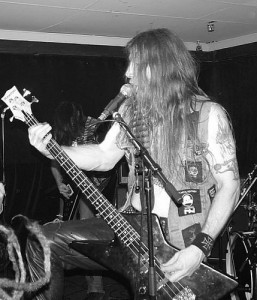 All this might have you thinking that the Nordic and Romantic styles of black metal were obsolete in Australia, but this was not to be the case. Abyssic Hate (whose “Cleansing with an Ancient Race” was a perfect match for the Immortal related Det Hedenske Folk on their split album) intended to capture the harsh poetry of Burzum and Ildjarn. Later material was somewhat unsuccessful because of humanocentric (“suicidal”) terminology, despite ambient leanings in songwriting. Nazxul was the Australian counterpart to mysticist bands like Nåstrond or Osculum Infame, whose cloaked, symbolic stage presence was a source of controversy. Theatrical, esoteric and arrogant, Nazxul did not fail to clothe oblique satanism in suggestive and venomous fury, at times surprisingly cerebral – especially on the mini-album “Black Seed”. Samain’s “Indomitus” recalled some of Enslaved’s and Graveland’s explorations in long songs influenced by folk and classical music, wandering through interludes and heavy, thunderous, emotional modes as if paralleling the documented trials of the ancient Indo-European tribes, whose mythological symbolism filled the lyrics.
All this might have you thinking that the Nordic and Romantic styles of black metal were obsolete in Australia, but this was not to be the case. Abyssic Hate (whose “Cleansing with an Ancient Race” was a perfect match for the Immortal related Det Hedenske Folk on their split album) intended to capture the harsh poetry of Burzum and Ildjarn. Later material was somewhat unsuccessful because of humanocentric (“suicidal”) terminology, despite ambient leanings in songwriting. Nazxul was the Australian counterpart to mysticist bands like Nåstrond or Osculum Infame, whose cloaked, symbolic stage presence was a source of controversy. Theatrical, esoteric and arrogant, Nazxul did not fail to clothe oblique satanism in suggestive and venomous fury, at times surprisingly cerebral – especially on the mini-album “Black Seed”. Samain’s “Indomitus” recalled some of Enslaved’s and Graveland’s explorations in long songs influenced by folk and classical music, wandering through interludes and heavy, thunderous, emotional modes as if paralleling the documented trials of the ancient Indo-European tribes, whose mythological symbolism filled the lyrics.
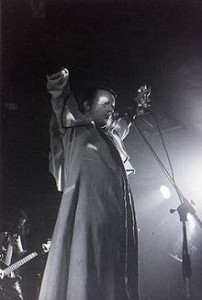 Gradually, we can note the presence of all the international metal trends and hypes increasing in Australia, filling the continent with meaningless bands. It would be a lie to say that the random band you hear from Australia is up to anything good. But there’s some you might like to hear. Asphyxia is a young technical death metal band, influenced by Nile, Kataklysm and the rest of the champions of convoluted hyperspeed – they are bit in love with the Necrophagist digital treachery fashion but they have room to develop and the players definitely deserve applause for their instrumental excursion. Midnight Odyssey uses oceanic layers of slow melody to transform black metal to a landscape of dark clouds, using keyboards in the evocative manner familiar from Schulze and Summoning. The best of the epics on “Firmament” rediscover a youthful, hopeful beauty that hasn’t been too fashionable in the image and commodity oriented latter days of black and death metal. Nazxul, who sadly lost a vital member to a motorcycle accident, released in 2009 their possible magnum opus, the immense “Iconoclast” which has established itself as one of my top black metal choices of the year despite initial skepticism towards the more standard imagery and vocabulary employed on the surface. Suggestively classical and elegant, as Emperor and Avzhia did it, Nazxul praise the unliving and the unknown with a Bach-ian playful sonority, adding themes, keyboards and guitar leads to basically simple songs the same way an alchemist adds prime materials to his boiling tincture of salvation. It is all, and much more, than most of Funeral Mist (and their ilk) tried to achieve with their experimental norsecore.
Gradually, we can note the presence of all the international metal trends and hypes increasing in Australia, filling the continent with meaningless bands. It would be a lie to say that the random band you hear from Australia is up to anything good. But there’s some you might like to hear. Asphyxia is a young technical death metal band, influenced by Nile, Kataklysm and the rest of the champions of convoluted hyperspeed – they are bit in love with the Necrophagist digital treachery fashion but they have room to develop and the players definitely deserve applause for their instrumental excursion. Midnight Odyssey uses oceanic layers of slow melody to transform black metal to a landscape of dark clouds, using keyboards in the evocative manner familiar from Schulze and Summoning. The best of the epics on “Firmament” rediscover a youthful, hopeful beauty that hasn’t been too fashionable in the image and commodity oriented latter days of black and death metal. Nazxul, who sadly lost a vital member to a motorcycle accident, released in 2009 their possible magnum opus, the immense “Iconoclast” which has established itself as one of my top black metal choices of the year despite initial skepticism towards the more standard imagery and vocabulary employed on the surface. Suggestively classical and elegant, as Emperor and Avzhia did it, Nazxul praise the unliving and the unknown with a Bach-ian playful sonority, adding themes, keyboards and guitar leads to basically simple songs the same way an alchemist adds prime materials to his boiling tincture of salvation. It is all, and much more, than most of Funeral Mist (and their ilk) tried to achieve with their experimental norsecore.
The old horde is still going strong, of course, as I got the initial inspiration for this writeup when interviewing Deströyer 666 (now based in Netherlands and the UK) elsewhere. With their latest album “Defiance”, they continue to quote the metal history all the way back to Judas Priest and the NWOBHM and this was of course much enjoyed by this writer even though it would be false to say that they would have reinvented, or even surpassed, their old selves in any manner. The scene is still brimming with offshoots of Anatomy and Bestial Warlust, such as Ignivomous, who on “Death Transmutation” have definitely listened their Incantation and Immolation, not without streamlining them to a more generic barbaric noise approach though, and Razor of Occam, whose “Homage to Martyrs” updates the violence of Sodom and Kreator to a new generation yet again, as wolves surrounding the throne room of Absu who stumbled and diluted their ancient black thrash in favor of “progressive” stylings that mostly only pleases reviewers in Terrorizer.
I know that mortals’ ears are already bleeding, but it’s impossible to escape this topic without mentioning a few curiosities from Adelaide group of total nutcases, starting the cult old school death metal band Martire back in the early 90s. The early demos and EP’s have been re-released multiple times. Since that, members who call themselves “The Great Righteous Destroyer” and “The Serpent Inquisitor” have continued to baffle the hapless headbangers with one after the other more indescribable and twisted songs. Stargazer’s Lovecraftian, off-center and racing death metal is what I personally consider the flagship band, whereas Cauldron Black Ram grooves like a joint venture of Celtic Frost and Running Wild members (in concept also). Misery’s Omen paints a hyper-dramatic curtain of dreamy black metal resembling Samael and a krautrock band on an endless bad acid trip, describing “Desolate Winds of Mars”, “Antarctic Ice Chasms” and other spectacles of consciousness awaking to the immense possibilities offered by nature itself, impersonal, cold but beautiful.
Gather ’round all you fire-starters
Whirlwind reapers and comet riders
Come to our mountain hall
Come and heed the call– Deströyer 666, The Calling
Written by Devamitra
Tags: abyssic hate, Australia, Australian Black Metal, Australian Death Metal, bestial warlust, Black Metal, death metal, destroyer 666, Disembowelment, ignivomous, martire, mortification, sadistik exekution, Speed Metal, stargazer, zine-articles
